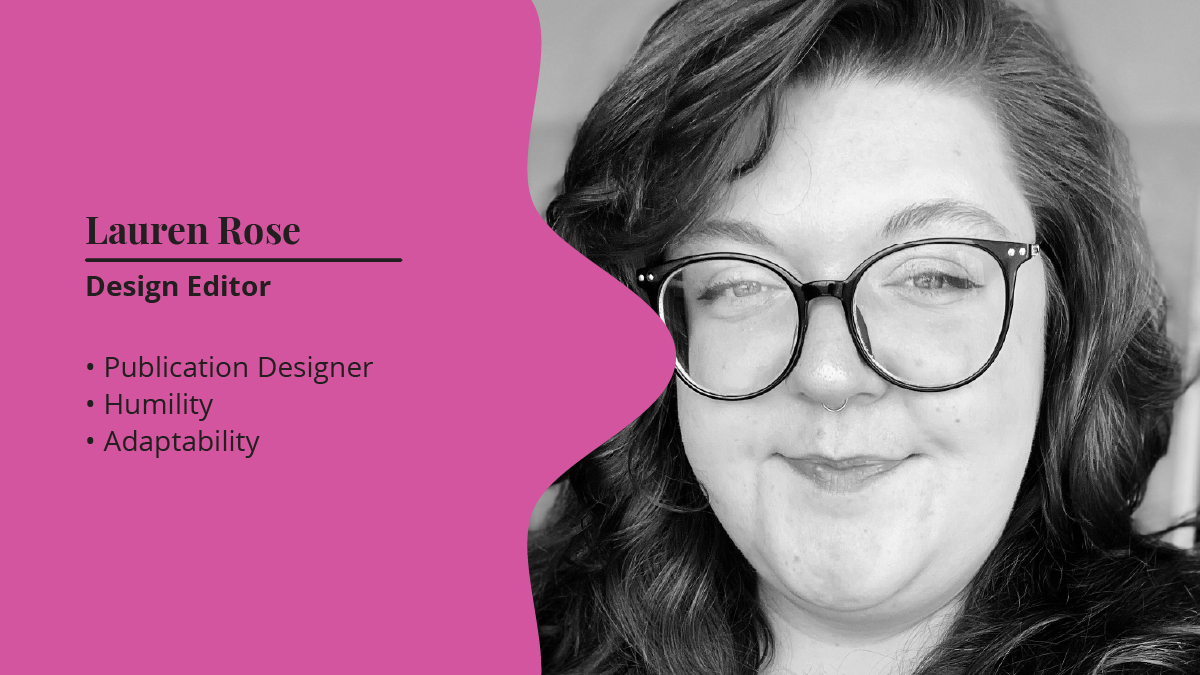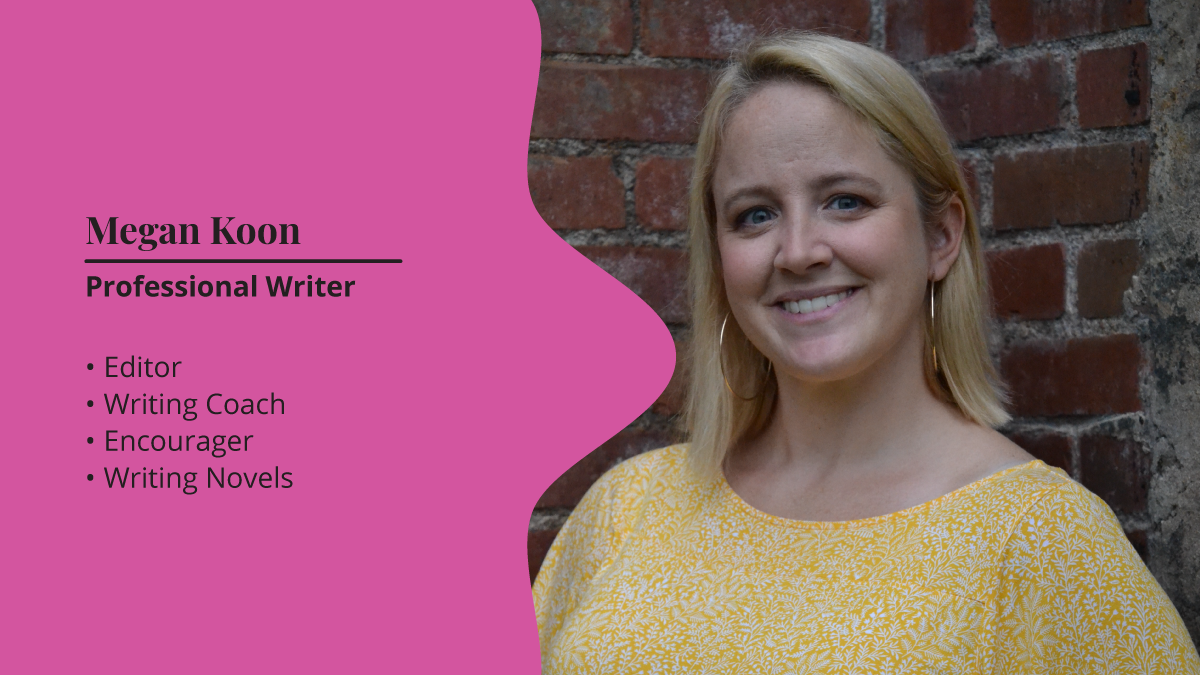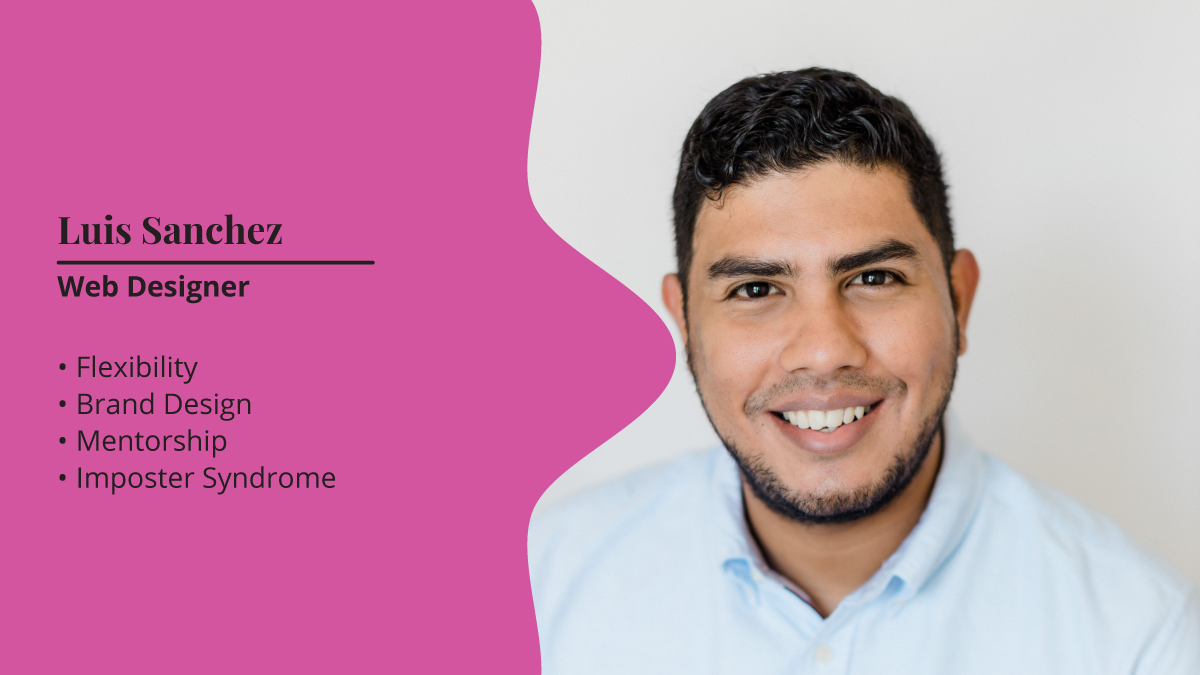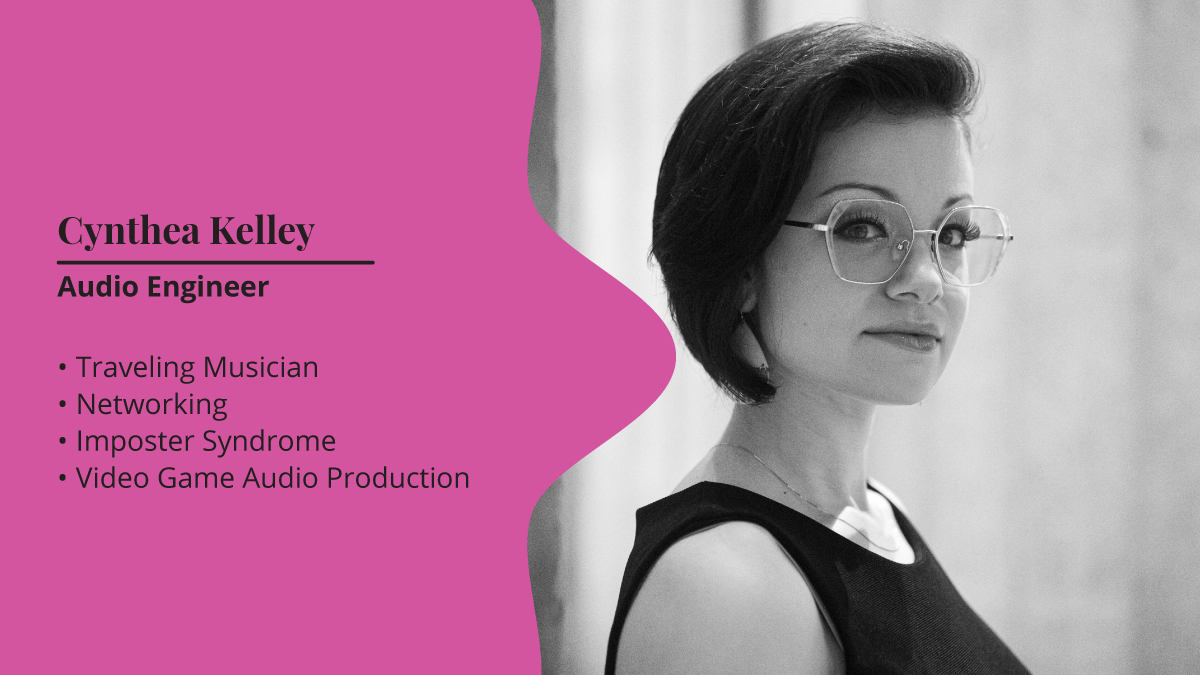“In any career where you are engaged in growing, it’s going to be challenging at points.”
Lauren Rose is a Coastal Carolina University (CCU) alumnus with a degree in design. Originally from Longs, S.C., she is a publication designer and Design Editor at North State Media in Raleigh, N.C.
Interview
Transcript
Lauren Rose
My name is Lauren Rose. Currently I am a publication designer, and I’m from Longs, South Carolina. I’m right outside Loris, a small unincorporated area. So I usually say Loris so people know.
Emma Plutnicki
And you’re, you’re from there? Or are you currently working there?
Lauren Rose
Oh, yeah, yeah. So yep, I was born and raised in that area and lived there until I was 22. And then I got, I graduated college and got my job. Pretty much three months out of college, I was very lucky and just moved to Raleigh, North Carolina. So I’m just up the state a little bit ahead, or above. But yeah.
Emma Plutnicki
Okay, so what exactly do you do for work? What’s your official title? And how long have you been working there?
Lauren Rose
So my official title today is Design Editor. I am basically in charge of all the design at a publishing company in North Carolina, North State Media, I’ve worked with them for, oof, 2016. So going on eight years, actually, March 1 will be eight years, I joined. So when I started, it was just one newspaper, I joined from the second issue. And I’ve been on every single issue since. Now, we have grown from one newspaper to seven newspapers. We do a statewide paper, and then we do local county papers. So when I was hired, I was just hired as a graphic designer, one of a few people, just putting words on the page. And since then, it has evolved into being in charge of the design and the direction of that for the paper. So it’s been, it’s been a lot, a lot of growth, but I’m very grateful for where I’m at right now.
Emma Plutnicki
Yeah. So you started as a graphic designer. How did you end up in that field? And how did you end up with your job now and kind of transition from graphic designer to now?
Lauren Rose
Yeah, so the field, it really started in high school, funny enough. I’ve always been into art. And even before high school, like as a kid, like, I love the art sets and just being creative. And going into high school, I was introduced to graphic design, digital photography, and for me that, like, it really combined my artistic side with, I also am a more analytical person. I like numbers, you know, very logic based. So graphic design to me was like a perfect mix. It was important to me if I was going to pursue this as a career that I do have some element of passion in it, I want to enjoy it. So through high school, I would do little, like, side gigs for people, flyers and all that. And then going into school, I didn’t really know what type of design I wanted to do. You know, there’s publication, there’s logo, branding, all of that. I think it was just kind of a series of events, I ended up applying to be the art director of the Chanticleer [the school newspaper]. And I was the art director for a year and a half. I was very proud. It really solidified my love of design, but then, newspaper, which is very interesting, because we think of paper newspapers, very dated and dying, like print instead. But it’s just, it’s been very interesting working in the industry, and just kind of, just kind of a series of events happened. And I happened to enjoy the journey along the way.
Emma Plutnicki
Yeah, I love that. So right now, what does your typical workday look like? What’s expected of you? What do you work on on a daily basis? What’s kind of your process?
Lauren Rose
So this is, this is gonna be fun to talk about, because my work week is not a typical nine to five at all. A lot of creative careers will probably, some won’t be like that, you know, I’m sure there are plenty of design firms with a nine to five, but a lot of my like, co workers and my peers, they’re up at all hours of the night. They work, they don’t work during the week, and then they work on the weekend, you know. So right now we’re weekly, we publish weekly. So the majority of my work happens Sunday through Tuesday on any given week. So I’ve really learned to be like flexible and it’s difficult to describe because it is so like fast pace, kind of like so during the week it, like, slows down and then I’ll do like your basic housekeeping, make new templates, maybe explore new design ideas. And then once Sunday hits, and I do work on the weekend, which is fine, but just on Sunday, but around Sunday is when I start getting all the content and the writers get their stuff in, the photographers get their stuff in. So I need to start formulating how I’m gonna lay this paper out. I, along with being the designer, I also work very closely with editors. They appreciate my input not only artistically, but with an editorial work, the design is as important as the content a lot of times so. So yeah, it is, it’s kind of like, it’s hard to describe, because it’s just so up and down. But we get it done every week somehow. And I think a lot of people can relate in this industry.
Emma Plutnicki
Yeah. On a specific project that you worked on, that you were like extremely passionate about, or like a defining moment in your creative journey, it could be a specific project that had a significant impact on you, or just something that really showcased your creativity?
Lauren Rose
So, probably when I was at Coastal [Carolina University], my favorite part about Coastal’s design department was the freedom you had. Like, of course, they had projects and guidelines, but they really encouraged you to do what you want, like, take this theory and make it work for you. So I did a few projects there that I was super proud of with the Athenaeum Press. I worked on Gullah: The Voice of an Island. I was very, very excited to work on that. We went to St. Helena, I did photography, I did some web design, even though it’s not necessarily my forte now, but very, very proud of that one. And I’m still good friends with Jen and Alli, and I see all the updates. And it just makes me happy to kind of see that as just kind of still existing. But that’s the one I tell everyone about I think kind of both in my professional career and just my colleagues, I always bring that up because it was like my first big project, but also one I had a lot of passion for. So.
Emma Plutnicki
I love that. Just in general, do you find your career challenging? How do you kind of bridge the challenges that you face, especially in a creative career?
Lauren Rose
Yes. I think in any career where you are engaged and growing, it’s going to be challenging at points. And I think that’s how I get through those challenging points. I really try to frame it as, you know, this isn’t a problem. This isn’t a struggle. It’s a way to test myself and adapt myself. I’m going to use last year as an example. We probably doubled company size last year alone, and we went from a small company to a midsize one. And that doesn’t sound like a lot. But you know, when you’re in a small startup, it’s changes. And there were some times last year I was like, “I’m quitting, I’m living in the woods. I’m not doing this, like it’s done, I’m done.” And, you know, what really just pushed me through was, let’s be realistic, we have bills, we have bills to pay, but again, like coming out with more knowledge. And I told myself today, like, if I had to redo it, I would be able to do it 10 times better, I would, I would have a better system. So the challenges aren’t there to keep you down. I kind of look at it as a way to grow. And I know that might sound a little cliche, but it is so applicable. And I find myself like thinking about these cliches that I’ve heard and I’m like, “You know what, they’re cliches, they’re for a reason, you know, like, they’re applicable. So.
Emma Plutnicki
Yeah. And in your work, are there any specific skills that you have that you find particularly important to have? Or can you recommend any special skills that someone applying for a job should have in their kind of toolbox to increase their chances of landing a field, er, landing a role in a creative field?
Lauren Rose
I think one of the biggest things that you can showcase to make yourself solidify your part at a company or within your coworkers, is going to be adaptability. Definitely being adaptable, and being open to different perceptions of things, especially in a creative field because you’re going to meet with clients who you’re like, “This is, my design, professors would kill me if they saw, like, what these people want,” you know, but you’re, it’s kind of like, that adaptability, that overcoming those challenges and letting them help you grow. And just being kind of, letting the ego go, like go into a job, willing to learn, willing to mess up and know that like you’re not being judged. I think more employers and co-workers appreciate someone who can say, “Yeah, you know what, I’m wrong. You’re right. Let’s go this direction.” And then, you know, you learn something along the way.
Lauren Rose
A few weeks ago, I had, I was designing an ad for an advertiser, and they were being very, very specific with their instructions. And it almost felt overbearing, and you know, I let myself, I was getting frustrated. I was like, oh, like, “design it yourself, blah, blah” in my head. And at the end of it, all their suggestions looked great and I was like, “You know what? They were right,” you know. I, learned something today, and I can implement it now. So, a lot of just being humble, kind of.
Emma Plutnicki
Yeah, that makes sense.
Lauren Rose
And I guess that’s more of a soft skill. I mean, obviously, you want to have technical skills, but I think that’s maybe not so much a skill, but a mindset also.
Emma Plutnicki
Yeah. And so you grew up in South Carolina, but you are now in North Carolina. Do you have any, like local organizations, programs or events that are either in South Carolina or North Carolina that have kind of helped you grow, either network or just helped inform you about creative fields?
Lauren Rose
This one was very specific to me. My high school art teacher, of course, you know. She was kind of my first line, to finding out about these things, being aware of these things, even knowing to look for these things. And just the fact that, you know, as my teacher, she was so accessible. And, you know, when she found out how passionate I was about things, and how serious I was about art, and pursuing it, like, you know, that gave her a directive to help me and, you know, really utilizing people and counselors at my high school. So that was probably my first way in. I definitely also entered a few small like little county fairs just to kind of get experience getting work out there, and just networking. And honestly, also in high school, I won the congressional art award for my district. And so my art like was in Washington DC for a while. And I just think little things like that helped, obviously, kind of get my name, get some stuff behind my name, but also, like, helped me realize, like, “Yeah, I’m an artist,” like people are looking at my work.
Lauren Rose
So there’s really not like one organization I can suggest. I think I would honestly suggest, especially in today’s age, it’s so different, because like, you can go on Facebook and Google or search like anything, and there’s groups for anything. So some of my advice might be a little outdated, but I just think like, the importance of kind of starting small, and not like shooting for the biggest, like the country wide competition, do your county, you know, do little things and, and then expose yourself. And then yeah, I think it’s all about growth.
Emma Plutnicki
Yeah, yeah, that makes sense. And so, just as we wrap up, do you have any advice for someone who is looking to break into a field, whether it’s a current college student or high school student who’s looking to get into a creative field, any advice?
Lauren Rose
It’s so hard, because there’s so many different types of creative fields. So I think if I had to just, like, generally approach it, I would just say, you know, you know, it is a job, it’s a means to an end, but you need to have some passionate about it, and you need to be interested in it. And you also need to think about, do I want to do this every day for 50 years? Like, is this something like, you know, there’s a lot of factors to that and it’s very individualized.



